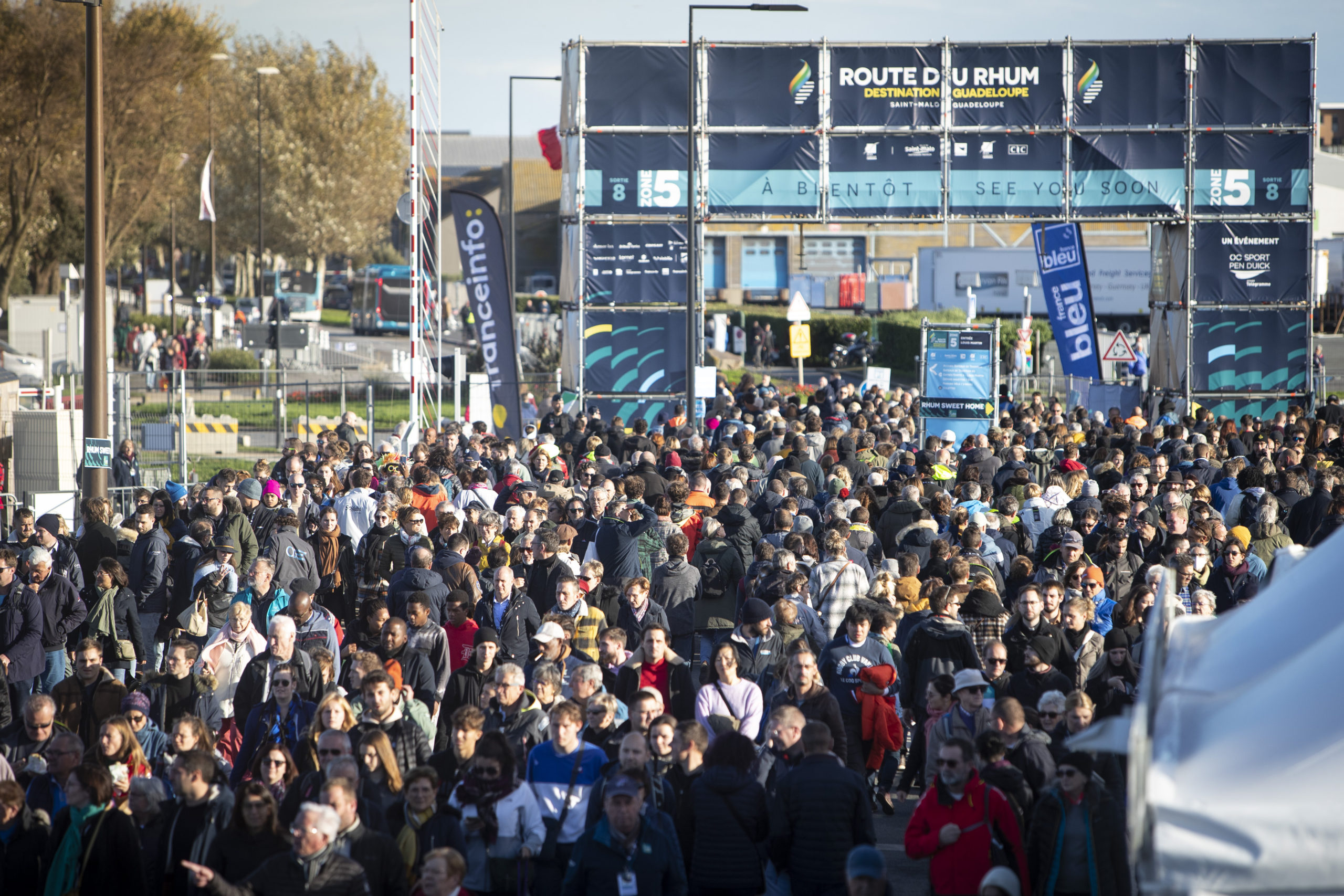With the time and date now set for the start of the 12th Route du Rhum – Destination Guadeloupe on Wednesday 9th November at 1415hrs, it looks like being a fast race.
After a rather tricky start, the models suggest that the fastest classes will be able to take advantage of favourable conditions allowing them to make fast miles on a course close to the Great Circle Route. Although finishing first is the aim of the competitors, smashing the race record would be the icing on the cake.
7 days, 14 hours, 21 minutes and 47 seconds
That is the outright record for the Route du Rhum – Destination Guadeloupe set in 2018 by Francis Joyon aboard IDEC Sport, a trimaran launched in 2006. Since then, there has been a lot of progress made to the Ultim 32/23 boats. On paper, Joyon’s record could be smashed, if the weather patterns allow that, which may well be the case looking at what lies ahead after the start on Wednesday 9th November.
Less than six days for the first Ultim 32/23 boats?
Alongside Franck Cammas, Morgan Lagravière is part of the weather unit working with Charles Caudrelier (Maxi Edmond de Rothschild). “If we had set off on Sunday, chances were slim of beating the record, as the very heavy weather would have impacted the way we managed the boat and her speed. There were a lot of uncertainties about the first few days of the race,” explained Morgan. “With the start postponed until Wednesday, the situation has changed considerably. Today, both weather models we use (CEP and GFS) agree. When we launch routing plans, we come up with some very interesting race times for an Ultim 32/23, beating the record and possibly finishing in less than six days. Finishing in less than a week and achieving such a record would be a bonus.”
Christian Dumard, who has helped Francis Joyon (IDEC Sport) in particular with his routing, also imagines a fast race. “Its not going to be that brilliant at the start with a front to cross and some heavy seas, but this is after all the starts to the Route du Rhum,” he explained. “After that, it should be very fast for all the different classes and particularly for the Ultim 32/23 multihulls. If they don’t break, we are looking at six days or even five and a half.”
A record too for the IMOCAs?
In the IMOCA class, the Route du Rhum – Destination Guadeloupe record has been held by François Gabart since 2014 with a race time of 12 days, 4 hours, 38 minutes and 55 seconds. He was then sailing on his boat launched in 2011, which did not have foils. The boat is back this year in the hands of Benjamin Ferré (Monnoyeur – Duo For a Job). Progress has been considerable since then with the arrival of foilers which perform increasingly well, particularly when reaching or sailing downwind. Morgan Lagravière is also working alongside Thomas Ruyant (LinkedOut).
“The routings for the best IMOCAs suggest a race time of less than eleven days,” he said. “The start of the race is difficult with a front to cross. After that, the conditions will be favourable with a wind allowing them to sail with the wind on the beam or downwind, which should enable high speeds. The trade winds seem to be well established. On top of that, the routes appear to be close to the Great Circle Route.”
Christian Dumard, who is working with several IMOCA skippers sees the first boats finishing in ten to eleven days. “The sea state will be the deciding factor determining whether they can stay close to the routing or not,” he stressed.
Ocean Fifty: the Atlantic in ten days?
The Ocean Fifty boats will probably be slower than the most recent IMOCAs during the first three or four days of the race, while the fleet heads west, as if the finish was in Charleston. Afterwards, they should gain an advantage in the trade winds. Given the sea state and wind conditions, it looks like being very physical for the fifty-foot boats, particularly between the Azores and Ireland. For an Ocean Fifty, the race record was set in 2014 by Erwan Le Roux with a time of 11 days, 5 hours, 13 minutes and 55 seconds. Once again competing this year, the skipper of Koesio is optimistic and hopes to do better.
“With the initial start, it would have taken us eleven days. Now we’re down to less than ten, as the ideal route is close to the Great Circle Route. We are going to have to be wary of the dangers ahead of the big front, which we should encounter at the longitude of the Azores.”
Class40: aiming for the record more than ever
The record held by Yoann Richomme since 2018 (16 days, 3 hours, 22 minutes and 44 seconds) is likely to be shattered in Pointe-à-Pitre. Tanguy Leglatin follows many of the Class40 skippers.
“It looks like we are seeing a routing close to the direct route with more or less the same number of fronts or maybe one fewer. It should be quicker,” he explained. Christian Dumard agrees, “Even if we’re looking some way ahead in the forecasts, the Class40 boats should complete the race quickly, maybe in fourteen or fifteen days.”
Fabien Delahaye, who has been working in particular with Yoann Richomme (Paprec Arkéa) and Corentin Douguet (Queguiner-Innoveo) gave us this analysis.
“From the tip of Brittany, the way is open to choose the route you want. We’re going to have to wait and see how the weather patterns develop, but a record is really possible.”
Apart from the weather, other factors have come into play, such as the power and ability of the new boats to cut through the water (scow bows) and the fact that there will be a fight to the finish.
“The competitors will be watching each other all the time and know full well whether a skipper is pushing hard or not. We’ll see whether they are all ready to give it that little bit extra,” added Tanguy Leglatin.
Finally in the Rhum Multi and Rhum Mono categories, the sailors are expecting to make good headway across the Atlantic. Fabrice Payen (Ille-et-Vilaine Cap vers l’inclusion) said, “I’ll continue to keep a close eye on the charts, but it looks like we’ll be setting sail in good conditions. The good news is that the charts indicate we should sail close to the shortest route. We’ll grab that opportunity as that is very different from what was forecasted with the initial start date. We can look forward to some great battles in each category with some fast race times in sight.”
















